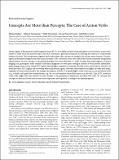| dc.contributor.author | Bedny, Marina | |
| dc.contributor.author | Caramazza, Alfonso | |
| dc.contributor.author | Grossman, Emily | |
| dc.contributor.author | Pascual-Leone, Alvaro | |
| dc.contributor.author | Saxe, Rebecca | |
| dc.date.accessioned | 2011-02-03T21:40:54Z | |
| dc.date.issued | 2008 | |
| dc.identifier.citation | Bedny, Marina, Alfonso Caramazza, Emily Grossman, Alvaro Pascual-Leone, and Rebecca Saxe. 2008. Concepts are more than percepts: The case of action verbs. Journal of Neuroscience 28(44): 11347-11353. | en_US |
| dc.identifier.issn | 0270-6474 | en_US |
| dc.identifier.uri | http://nrs.harvard.edu/urn-3:HUL.InstRepos:4699591 | |
| dc.description.abstract | Several regions of the posterior-lateral-temporal cortex (PLTC) are reliably recruited when participants read or listen to action verbs, relative to other word and nonword types. This PLTC activation is generally interpreted as reflecting the retrieval of visual-motion features of actions. This interpretation supports the broader theory, that concepts are comprised of sensory–motor features. We investigated an alternative interpretation of the same activations: PLTC activity for action verbs reflects the retrieval of modality-independent representations of event concepts, or the grammatical types associated with them, i.e., verbs. During a functional magnetic resonance imaging scan, participants made semantic-relatedness judgments on word pairs varying in amount of visual-motion information. Replicating previous results, several PLTC regions showed higher responses to words that describe actions versus objects. However, we found that these PLTC regions did not overlap with visual-motion regions. Moreover, their response was higher for verbs than nouns, regardless of visual-motion features. For example, the response of the PLTC is equally high to action verbs (e.g., to run) and mental verbs (e.g., to think), and equally low to animal nouns (e.g., the cat) and inanimate natural kind nouns (e.g., the rock). Thus, PLTC activity for action verbs might reflect the retrieval of event concepts, or the grammatical information associated with verbs. We conclude that concepts are abstracted away from sensory–motor experience and organized according to conceptual properties. | en_US |
| dc.description.sponsorship | Psychology | en_US |
| dc.language.iso | en_US | en_US |
| dc.publisher | The Society for Neuroscience | en_US |
| dc.relation.isversionof | http://dx.doi.org/10.1523/JNEUROSCI.3039-08.2008 | en_US |
| dc.relation.hasversion | http://www.wjh.harvard.edu/~caram/PDFs/2008_Bedny_et_al.pdf | en_US |
| dash.license | LAA | |
| dc.subject | language | en_US |
| dc.subject | sensory-motor | en_US |
| dc.subject | temporal | en_US |
| dc.subject | concept | en_US |
| dc.subject | memory | en_US |
| dc.subject | visual motion | en_US |
| dc.title | Concepts Are More than Percepts: The Case of Action Verbs | en_US |
| dc.type | Journal Article | en_US |
| dc.description.version | Version of Record | en_US |
| dc.relation.journal | The Journal of Neuroscience | en_US |
| dash.depositing.author | Caramazza, Alfonso | |
| dc.date.available | 2011-02-03T21:40:54Z | |
| dc.identifier.doi | 10.1523/JNEUROSCI.3039-08.2008 | * |
| dash.contributor.affiliated | Bedny, Marina | |
| dash.contributor.affiliated | Caramazza, Alfonso | |


